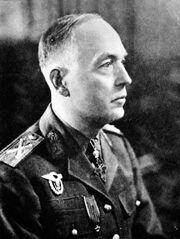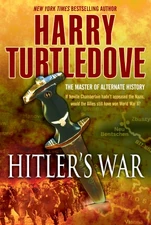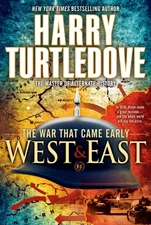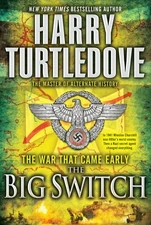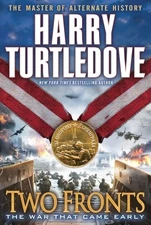TR (Message Wall | contribs) No edit summary |
TR (Message Wall | contribs) |
||
| Line 17: | Line 17: | ||
In 1939, '''Ion Antonescu''' was a power to be reckoned with in [[Romania (The War That Came Early)|Romania]], although Romania itself remained neutral at the outset of the [[Europe (The War That Came Early)|European]] [[World War II (The War That Came Early)|war]]. When [[United States (The War That Came Early)|American]] [[Peggy Druce]] considered travelling to [[Hungary (The War That Came Early)|Hungary]] and then Romania to get back to the United States, American diplomat [[Constantine Jenkins]] warned her that Marshal<ref>See: [[Inconsistencies in Turtledove's Work#Inconsistencies in The War That Came Early|Inconsistencies in Turtledove's work]].</ref> Antonescu and his followers might not allow her to cross from Hungary into their country, though this had more to do with frosty relations between the two countries than with anything related to Druce herself.<ref>''[[Hitler's War]], pg. 387</ref> |
In 1939, '''Ion Antonescu''' was a power to be reckoned with in [[Romania (The War That Came Early)|Romania]], although Romania itself remained neutral at the outset of the [[Europe (The War That Came Early)|European]] [[World War II (The War That Came Early)|war]]. When [[United States (The War That Came Early)|American]] [[Peggy Druce]] considered travelling to [[Hungary (The War That Came Early)|Hungary]] and then Romania to get back to the United States, American diplomat [[Constantine Jenkins]] warned her that Marshal<ref>See: [[Inconsistencies in Turtledove's Work#Inconsistencies in The War That Came Early|Inconsistencies in Turtledove's work]].</ref> Antonescu and his followers might not allow her to cross from Hungary into their country, though this had more to do with frosty relations between the two countries than with anything related to Druce herself.<ref>''[[Hitler's War]], pg. 387</ref> |
||
| − | Antonescu kept Romania neutral until early 1941, when, in the aftermath of the [[Hess Agreement|"big switch"]], Romania declared war on the USSR, joining a substantial [[World War II (The War That Came Early)#Phase Two|multi-national coalition]]<ref>''[[Coup d'Etat]]'', pgs. 63-64, HC.</ref> |
+ | Antonescu kept Romania neutral until early 1941, when, in the aftermath of the [[Hess Agreement|"big switch"]], Romania declared war on the USSR, joining a substantial [[World War II (The War That Came Early)#Phase Two|multi-national coalition]]<ref>''[[Coup d'Etat]]'', pgs. 63-64, HC.</ref> in exchange for the port of [[Odessa#Odessa in The War That Came Early|Odessa]] and the adjoining lands on the far bank of the [[Dniester]].<ref>Ibid., pg. 124.</ref> |
| − | {{Ongoing Series}} |
||
| + | Romania remained a German ally even after the British and the French left their alliance before the end of 1941. Throughout the remainder of the war, Romanian troops fought exclusively in the [[Ukraine (The War That Came Early)|Ukraine]], but they had insufficient artillery and tanks to support the infantry. Consequently, Romanians were generally more willing to surrender rather than fight.<ref>''[[Two Fronts]]'', pg. 302-303.</ref> Surrender didn't save them from the gulags.<ref>Ibid., pg. 305.</ref> Moreover, given the historical animosity between Romania and Germany's other staunch ally, [[Hungary (The War That Came Early)|Hungary]], the German military placed German units between the Hungarian and Romanian units on the lines.<ref>''[[Last Orders]]'', pg. 27-28.</ref> However, by 1943, Germany's situation was so dire that an unreliable ally was better than no ally. |
||
| − | <references/> |
||
| + | |||
| + | As 1943 ended, Germany was in constant retreat, prompting Marshal Antonescu to publicly announce that Romania was not leaving the war.<ref>Ibid., pg. 199.</ref> In April, 1944, the [[Committee for the Salvation of the German Nation]] overthrew [[Adolf Hitler (The War That Came Early)|Adolf Hitler]] and the [[Nazi Party (The War That Came Early)|Nazis]], bringing the war to a halt in Europe. <ref>Ibid., pgs. 300, 311, HC.</ref> Romania derived no benefit from its alliance with Germany. |
||
| + | |||
| + | ==References== |
||
| + | {{Reflist}} |
||
{{S-start}} |
{{S-start}} |
||
{{S-off}} |
{{S-off}} |
||
Revision as of 06:30, 20 December 2014
| ||||||||||||||||||||||||||||
Ion Antonescu (1882-1946) was the Conducător (leader) and prime minister of Romania for most of World War II, after leading the overthrow of Carol II in 1940. He nominally was co-head of state with King Michael, but most of the actual power rested with Antonescu. A firm anti-Semite, Antonescu independently implemented policies, based on the Nazi model, that were responsible for the deaths of some 40,000 Jews. Under Antonescu, Romania entered the War on the side of the Axis. He survived one coup attempt by the Iron Guard party, a like-minded politicial rival whom Antonescu smashed with the aid of Germany. Antonescu allocated troops for the invasion of the Soviet Union in 1941.
When the tide turned against the Axis, Antonescu attempted to reach a peace with the Allies in 1944, but was instead successfully toppled by a coalition led by King Michael. He was tried in 1946 for war crimes, convicted, and executed.
Ion Antonescu in The War That Came Early
In 1939, Ion Antonescu was a power to be reckoned with in Romania, although Romania itself remained neutral at the outset of the European war. When American Peggy Druce considered travelling to Hungary and then Romania to get back to the United States, American diplomat Constantine Jenkins warned her that Marshal[1] Antonescu and his followers might not allow her to cross from Hungary into their country, though this had more to do with frosty relations between the two countries than with anything related to Druce herself.[2]
Antonescu kept Romania neutral until early 1941, when, in the aftermath of the "big switch", Romania declared war on the USSR, joining a substantial multi-national coalition[3] in exchange for the port of Odessa and the adjoining lands on the far bank of the Dniester.[4]
Romania remained a German ally even after the British and the French left their alliance before the end of 1941. Throughout the remainder of the war, Romanian troops fought exclusively in the Ukraine, but they had insufficient artillery and tanks to support the infantry. Consequently, Romanians were generally more willing to surrender rather than fight.[5] Surrender didn't save them from the gulags.[6] Moreover, given the historical animosity between Romania and Germany's other staunch ally, Hungary, the German military placed German units between the Hungarian and Romanian units on the lines.[7] However, by 1943, Germany's situation was so dire that an unreliable ally was better than no ally.
As 1943 ended, Germany was in constant retreat, prompting Marshal Antonescu to publicly announce that Romania was not leaving the war.[8] In April, 1944, the Committee for the Salvation of the German Nation overthrew Adolf Hitler and the Nazis, bringing the war to a halt in Europe. [9] Romania derived no benefit from its alliance with Germany.
References
- ↑ See: Inconsistencies in Turtledove's work.
- ↑ Hitler's War, pg. 387
- ↑ Coup d'Etat, pgs. 63-64, HC.
- ↑ Ibid., pg. 124.
- ↑ Two Fronts, pg. 302-303.
- ↑ Ibid., pg. 305.
- ↑ Last Orders, pg. 27-28.
- ↑ Ibid., pg. 199.
- ↑ Ibid., pgs. 300, 311, HC.
| Political offices (OTL) | ||
|---|---|---|
| Preceded by Ion Gigurtu |
Prime Minister of Romania 1940-1944 |
Succeeded by Constantin Sănătescu |
| Preceded by Carol II (as King of Romania) |
Conducător of Romania (co-head of state) 1940-1944 With: Michael of Romania |
Succeeded by Michael of Romania (as sole head of state) |
| ||||||||||||||||||||||
